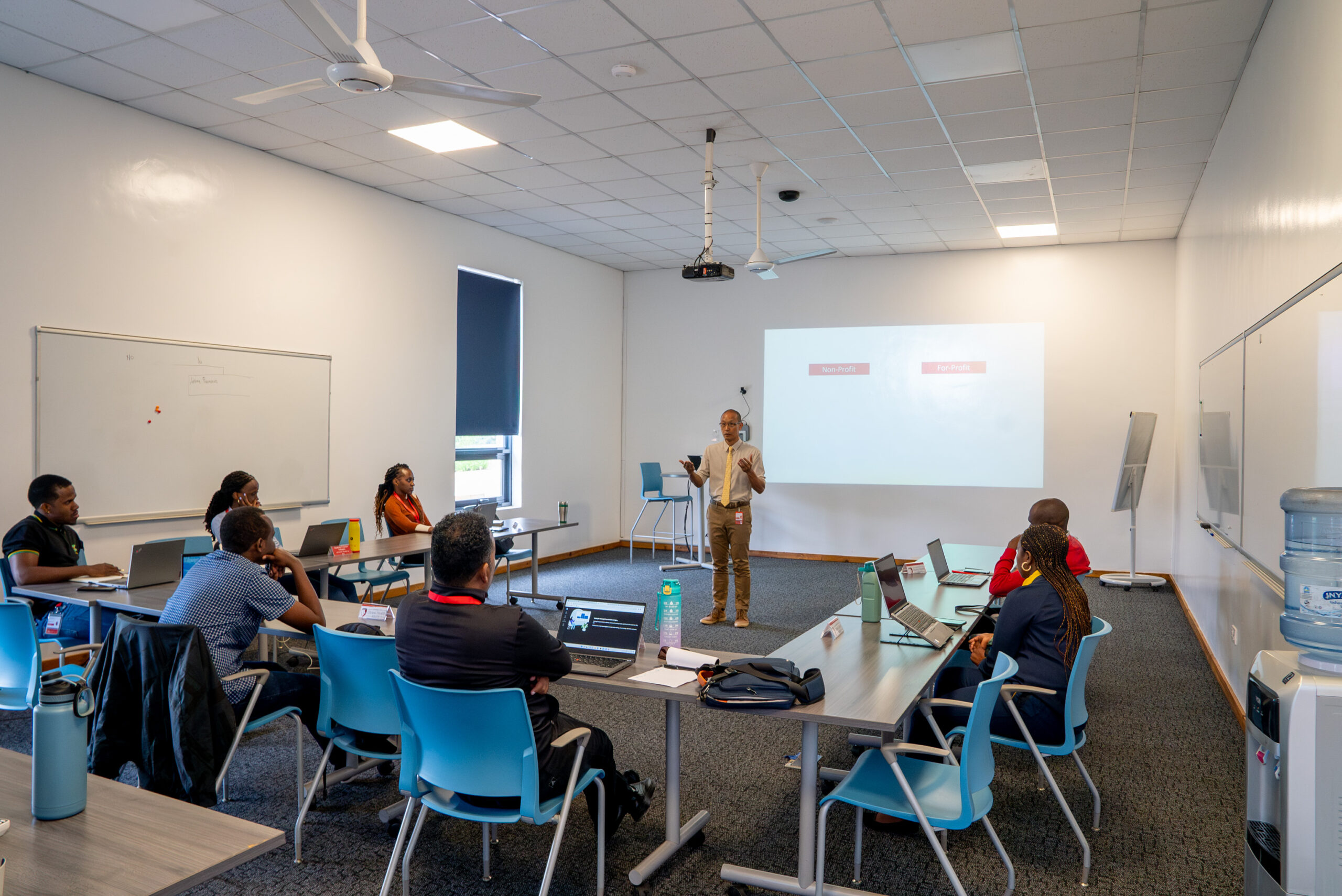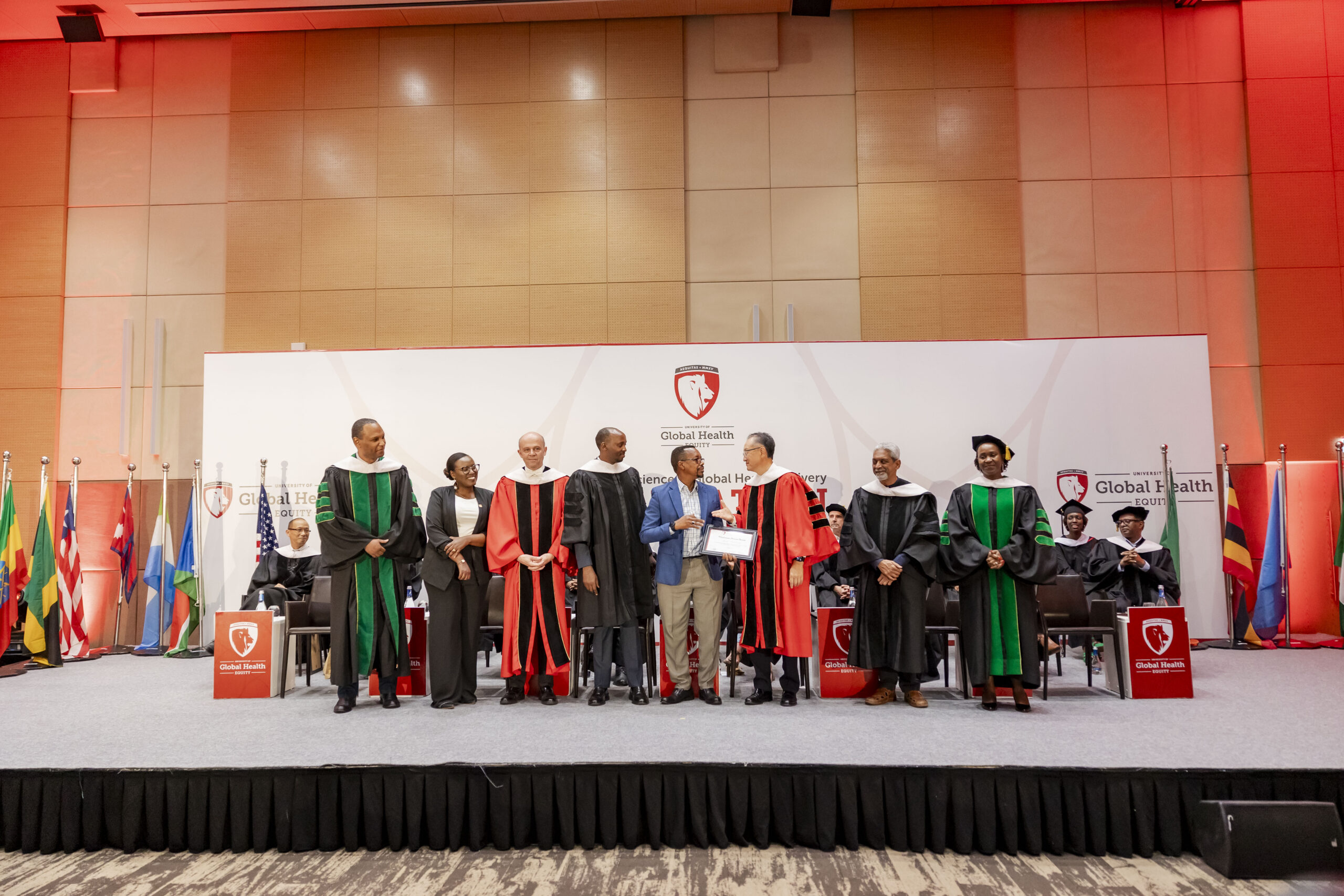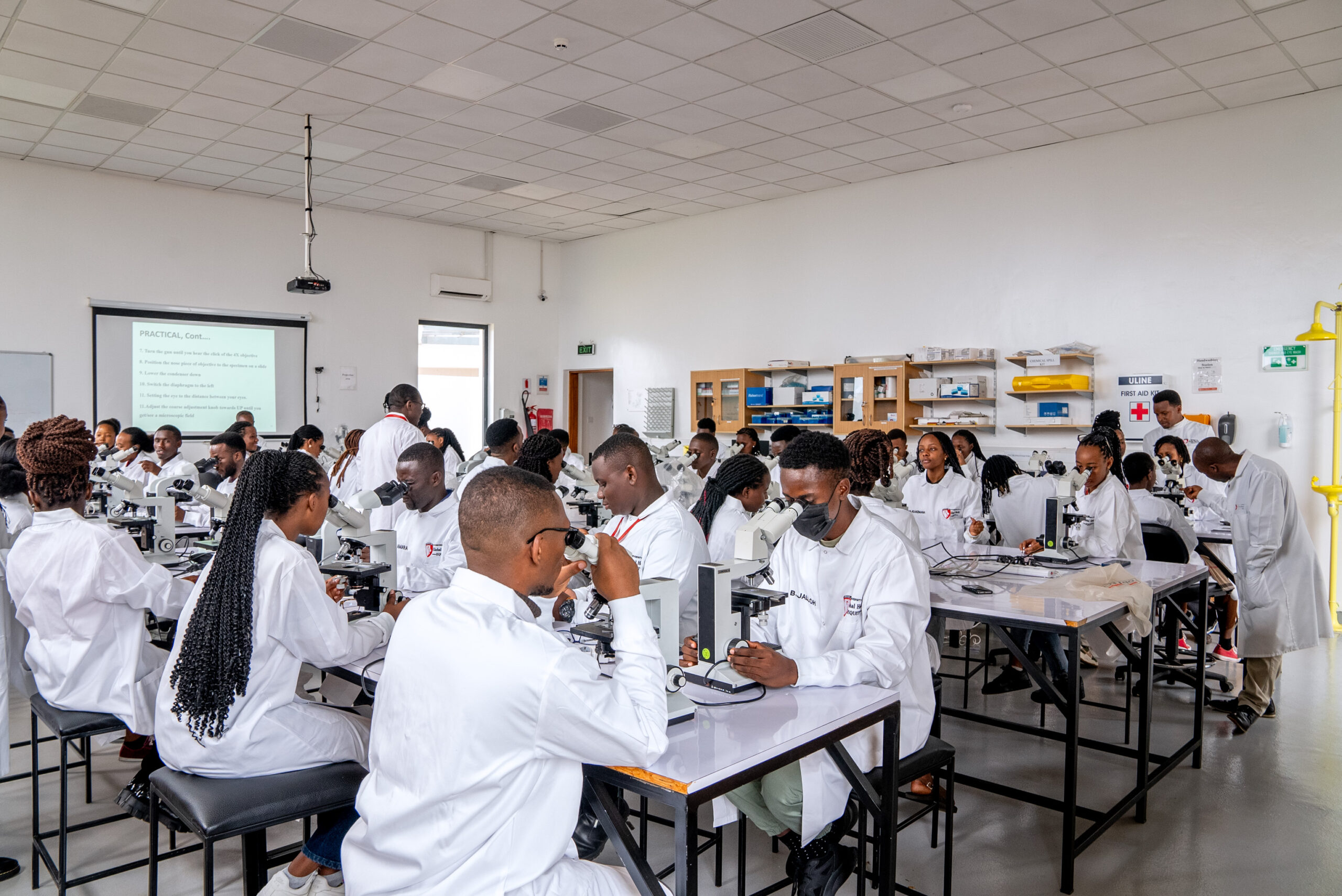Master of Science in Global Health Delivery – MGHD
November 22, 2024 2025-05-06 7:20Master of Science in Global Health Delivery – MGHD
Master of Science – MGHD in Global Health Delivery
The Master of Science in Global Health Delivery (MGHD) is UGHE’s flagship academic program. Modeled after a similar program at Harvard Medical School, the MGHD provides a one-of-a-kind learning experience fundamentally rooted in the principles of global health, One Health, epidemiology, global health policy, management, health finance, and leadership.
About MGHD
The MGHD program prepares students to serve in health care delivery settings across the globe by:
- Prioritizing hands-on and practical field experience: Lessons are disseminated through problem-based and experiential learning, and incorporate case studies, group work, and field visits. Students gain experience in evidence-based management and delivery through the Practicum, which fosters professional development and career networking, and equips them with effective problem-solving skills.
- Focusing on “systems” rather than symptoms: Addressing the critical social and systemic forces causing inequities and inefficiencies in health care delivery requires a comprehensive understanding of effective delivery systems. Knowledge of the broader social, political, and environmental factors that matter for health pushes students to look at the bigger picture.
- Emphasizing leadership and management: While many health education programs see these skills as an “add-on,” UGHE believes training in leadership and management is essential to developing a generation of bold leaders who push for large-scale change in health systems. Students also receive individual mentorship throughout the MGHD program.

MGHD Options
Global Health is a complex and multifaceted field of study. Global health professionals often specialize in specific areas to allow them to fully develop their skills and interests, and, in turn, maximize their contribution to achieving global health equity.
Recognizing such needs, the Master of Science in Global Health Delivery (MGHD) at University of Global Health Equity (UGHE) has designed the curriculum to prepare individuals to become leaders in the different areas of global health. Students can choose from the following four options to add specificity and personalized instructions their studies as they earn their MGHD: One Health, Health Management, Gender, Sexual and Reproductive Health, and Global Surgery.
MGHD Learning Objectives
Interdisciplinary collaboration is essential to improving health outcomes and to achieving greater equity within a given population. This approach emphasizes transnational health issues through strategies such as prevention, disease detection, systems management, and individual and population-based interventions. The MGHD curriculum incorporates leadership and management training to develop graduates with the ability to design and implement programs as well as to skillfully manage the organizations.

1.Knowledge and Understanding – At the end of the program, students should demonstrate a knowledge and understanding of:
- Historical, political, scientific, and practical approaches to existing and emerging global health problems
- Cultural, social, economic, and environmental determinants of global health and health disparities
- Principles of measurement and analysis, including applied research
- Ethical issues involving global health practice, research, and governance
2. Application of Knowledge – At the end of the program, students should be able to:
- Identify and assess factors influencing healthcare delivery
- Utilize leadership and strategic thinking skills to define problems and to set priorities for improvement
- Design action plans and implement solutions to address challenges faced by health service delivery organizations
- Use data to identify, prioritize, design, and evaluate the impact of interventions on the quality of care
3. Communication/Information and Communications Technology/Numeracy/Analytic Techniques/Practical Skills – At the end of the program, students should demonstrate:
- The application of fundamental analytic and investigative tools including epidemiology, biostatistics, and qualitative research methods
- The ability to write clear and compelling programmatic reports, funding proposals, and health education materials for colleagues and for public audiences
- The ability to provide constructive feedback to subordinates, peers, and superiors
4.General Transferable Skills – At the end of the program, students should be able to:
- Employ the principles of evidence-based implementation to translate research into practice to improve healthcare delivery and financing systems
- Demonstrate leadership to promote organizational development
- Train and mentor others in the field of global health delivery
- Address complex operational challenges effectively and efficiently
- Engage in practices that lead to lifelong learning, as well as personal and professional development
Applications for the MGHD Program Class of 2026 Are Open!
UGHE’s Office of Admissions takes a holistic approach to the admissions process. The Admissions Committee takes into account a broad range of application criteria, including supplemental documents, professional experience, exams, interviews, and overall alignment with the UGHE’s mission and vision.
Impact
Since its inauguration, UGHE has graduated nine cohorts, building an alumni network of 288 individuals across 25 countries. Seventy-three percent of our graduates secured employment within three months of graduation, with 65% reporting an increase in salary. Many alumni have risen to leadership roles in prominent organizations such as WHO, UNICEF, UNHCR, USAID, CHAI, and PIH. Within Rwanda, a significant number of MGHD alumni hold key leadership positions in the Ministry of Health, including:
- Dr. Yvan Butera, Rwandan Minister of State for Health
- Denise Wanyana, Advisor to the Minister of State
- Menelas Nkeshimana, Head of the Department of Health Workforce
Notably, in January 2024, six MGHD alumni were appointed to key roles within Rwanda’s Ministry of Health.
Our MGHD Alumni have also received many accolades throughout the years, below are some examples:
- Rising Star Award (World Federation Society of Anesthesiology) 2024
- Rwanda Woman of Courage Award (USA Embassy) 2019
- The Queen Young leader award (Queen Elizabeth Diamond Jubilee Trust) 2017
- Program Management Award (Catholic Relief Services) 2019
- WHO-TDR Award (WHO) 2016
- Excellence in Advancement of Diversity and Social Justice Award (American University of Beirut)
- 120 Under 40: The New Generation of Family Planning Leaders

Partnerships
Since inauguration, the MGHD has been collaborating with various education institutions and Health Organizations
Harvard School of Medicine
York University
Rwanda MOH
Rwanda Biomedical Center - RBC
JHPIEGO
Clinton Health Access Initiative - CHAI
University of Rwanda - UR
United States Agency for International Development - USAID
PATH
FAQs
1. Is UGHE an accredited institution?
UGHE is a fully accredited Global University in Rwanda. Graduates from the MGHD program are competitive candidates for future employers and educational opportunities.
Campus Location – All students will live on UGHE’s beautiful residential campus in Butaro. The campus is located approximately 2.5 hours from Kigali, Rwanda’s capital city, and 1.5 hours from Musanze, in the Northern Province.
Facilities include administrative complex, science lab, simulation center, library, fully equipped classrooms, recreation facilities, dining hall, housing units.
2. What is the Structure of the MGHD program?
UGHE currently offers a Master of Science in Global Health Delivery (MGHD) with the following options: 1) Gender, Sexual and Reproductive Health, 2) One Health 3) Health Management, and 4) Global Surgery, a one-year full-time program from August 2024 to August 2025.
MGHD Options

One Health
Developing the skills to formulate solutions to complex ‘wicked’ problems requires specialized training and a broad-based, transdisciplinary perspective. The One Health option will provide training critical to continue improving the health of people, animals, and the environment. It will involve cross-disciplinary training to help MGHD candidates understand both the technical and social context in which the answers to One Health problems can be approached. The option in One Health will serve to prepare leaders with a broad base of knowledge as well as cross-cutting skills directed towards improving the health of animals, the environment, and humans through a transdisciplinary, multi-sectoral, and holistic approach. Click this link for more information.
Health Management
Healthcare delivery is complex and context-dependent and requires an interdisciplinary effort focused on value. Regardless of where you work, what programs you are doing, or creating your own entrepreneurial venture, the combination of practical and effective management and leadership skills is essential to generate high-value programs.
In Health Management, students will learn the key strategy and management practices in global health programs. It is designed to train global health professionals in how to apply evidence-based and field-tested managerial functions to manage complex programs and organizations. Students will learn from using data and evidence to identify project areas, using management tools in developing a health program, securing funding, and managing different aspects of the execution of the program, through active learning methodologies. Click this link for more information.
Gender, Sexual, and Reproductive Health
Application of a gender lens to health programs and specifically to sexual and reproductive health is a crucial step in ensuring a healthy family, healthy community, and healthy nations. The Gender, Sexual, and Reproductive Health option will provide interdisciplinary training on theories, perspectives, policies, and sexual and reproductive health management practices to provide the next generation of healthcare delivery professionals with a broader understanding of the topic. Armed with experience and technical abilities, graduates will be uniquely prepared to solve large, trans-border global gender and sexual and reproductive health problems. Click this link for more information.
Global Surgery
While surgery has not always been considered a global health priority, surgical conditions form a significant burden of disease with surgical interventions playing a major role in helping to prevent death and chronic disability from road traffic injuries, burns, obstetric conditions, and many non-communicable conditions such as heart disease. Expanding access to surgical care in sub-Saharan Africa while safeguarding patients from catastrophic expenditures is a complex, multifactorial challenge. The master’s program will serve to prepare specialized leaders with a broad base of knowledge and skills directed towards improving the health of populations through effective surgical care delivery in Rwanda, the continent, and beyond. Click this link for more information.
What is fieldwork / Practicum opportunities?
During the Practicum, students will work in groups to carry out a research or quality improvement project for a partner organization. Each group will be mentored by a UGHE faculty member and a preceptor from the partner organization (which may be outside of Rwanda). In collaboration with stakeholders from the organization, students will propose and design a project that will address a challenge the partner organization is facing. Students will then travel to the site of their partner organization to implement the project. After 12-weeks onsite, students will return to campus and produce tangible academic deliverables as well as products for wider dissemination, including recommendations for system improvement, training programs, future research, program evaluation, and policy memos. View the MGHD course catalog.
Who are the MGHD faculty members?



